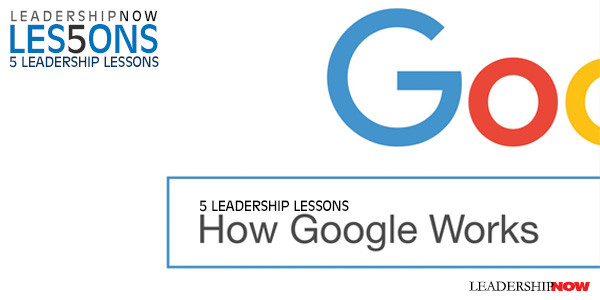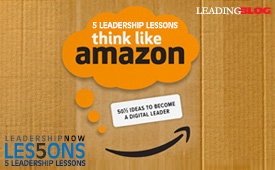5 Leadership Lessons: How Google Works

How Google Works by Eric Schmidt and Jonathan Rosenberg is how Google created its innovative and productive culture.
The book is full of principles that if they can’t be implemented outright in your own workplace, they can by degrees. You won’t find debates about social issues, but then that’s not what this book is about. It’s about how Google goes about doing what it does do—day to day. It about managing smart creatives in a family-type atmosphere.
 Offices should be designed to maximize energy and interactions, not for isolation and status. Smart creatives thrive on interacting with each other. The mixture you get when you cram them together is combustible, so a top priority must be to keep them crowded.
Offices should be designed to maximize energy and interactions, not for isolation and status. Smart creatives thrive on interacting with each other. The mixture you get when you cram them together is combustible, so a top priority must be to keep them crowded.
 Don’t listen to the HiPPOs. The Highest-Paid-Person’s-Opinion. When it comes to the quality of decision-making, the pay level is intrinsically irrelevant and experience is valuable only if it is used to frame a winning argument. Unfortunately, in most companies, experience is the winning argument. We call these places “tenurocracies,” because power derives from tenure, not merit. It reminds us of our favorite quote from Jim Barksdale, erstwhile CEO of Netscape: “If we have data, let’s look at data. If all we have are opinions, let’s go with mine.”
Don’t listen to the HiPPOs. The Highest-Paid-Person’s-Opinion. When it comes to the quality of decision-making, the pay level is intrinsically irrelevant and experience is valuable only if it is used to frame a winning argument. Unfortunately, in most companies, experience is the winning argument. We call these places “tenurocracies,” because power derives from tenure, not merit. It reminds us of our favorite quote from Jim Barksdale, erstwhile CEO of Netscape: “If we have data, let’s look at data. If all we have are opinions, let’s go with mine.”
 One of our early engineers, Matt Cutts, recall how he would often see Urs Hölzle, the engineering executive who led the creation of Google’s data center infrastructure, pick up small bits of trash in the hallway as he walked through the office. With these actions, the leaders demonstrate their egalitarian natures—we’re all in this together and none of us are above the menial tasks that need to get done. Mostly, though, they do it because they care so much about the company. Leadership requires passion. If you don’t have it, get out now.
One of our early engineers, Matt Cutts, recall how he would often see Urs Hölzle, the engineering executive who led the creation of Google’s data center infrastructure, pick up small bits of trash in the hallway as he walked through the office. With these actions, the leaders demonstrate their egalitarian natures—we’re all in this together and none of us are above the menial tasks that need to get done. Mostly, though, they do it because they care so much about the company. Leadership requires passion. If you don’t have it, get out now.
 Our ideal candidates are the ones who prefer roller coasters, the ones who keep learning. These “learning animals” have the smarts to handle massive change and the character to love it. Most people, when they are hiring for a role, look for people who have excelled in that role before. This is not how you find a learning animal. Favoring specialization over intelligence is exactly wrong, especially in high tech. The world is changing so fast across every industry and endeavor that it’s a given the role for which you’re hiring is going to change.
Our ideal candidates are the ones who prefer roller coasters, the ones who keep learning. These “learning animals” have the smarts to handle massive change and the character to love it. Most people, when they are hiring for a role, look for people who have excelled in that role before. This is not how you find a learning animal. Favoring specialization over intelligence is exactly wrong, especially in high tech. The world is changing so fast across every industry and endeavor that it’s a given the role for which you’re hiring is going to change.
 Google[x] has a simple Venn diagram that it uses to determine if it will pursue an idea. First, the idea has to be something that addresses a big challenge or opportunity, something that affects hundreds of millions or billions of people. Second, they have to have an idea for a solution that is radically different from anything currently in the market. We aren’t trying to improve on an existing way of doing something, rather we want to start over. And third, the breakthrough technologies that could bring that radical solution to life have to be at least feasible, and achievable in the not-too-distant future. Before the [x] team starts pursuing any idea, it first checks to see if the idea fits into this three-part paradigm. If it doesn’t, it is rejected.
Google[x] has a simple Venn diagram that it uses to determine if it will pursue an idea. First, the idea has to be something that addresses a big challenge or opportunity, something that affects hundreds of millions or billions of people. Second, they have to have an idea for a solution that is radically different from anything currently in the market. We aren’t trying to improve on an existing way of doing something, rather we want to start over. And third, the breakthrough technologies that could bring that radical solution to life have to be at least feasible, and achievable in the not-too-distant future. Before the [x] team starts pursuing any idea, it first checks to see if the idea fits into this three-part paradigm. If it doesn’t, it is rejected.

There’s a lot more on communication (You need to say something twenty times, but if you do and they still don’t get it, then the problem is with the theme, not the communications), competition (“If you focus on your competition, you will never deliver anything truly innovative”) and hiring (“Great talent often doesn’t look and act like you”), including ten or so pages on Google’s hiring dos and don’ts and career advice.
* * *

Like us on
Instagram and
Facebook for additional leadership and personal development ideas.
* * *




Posted by Michael McKinney at 11:29 PM
Permalink
| Comments (0)
| This post is about Five Lessons











